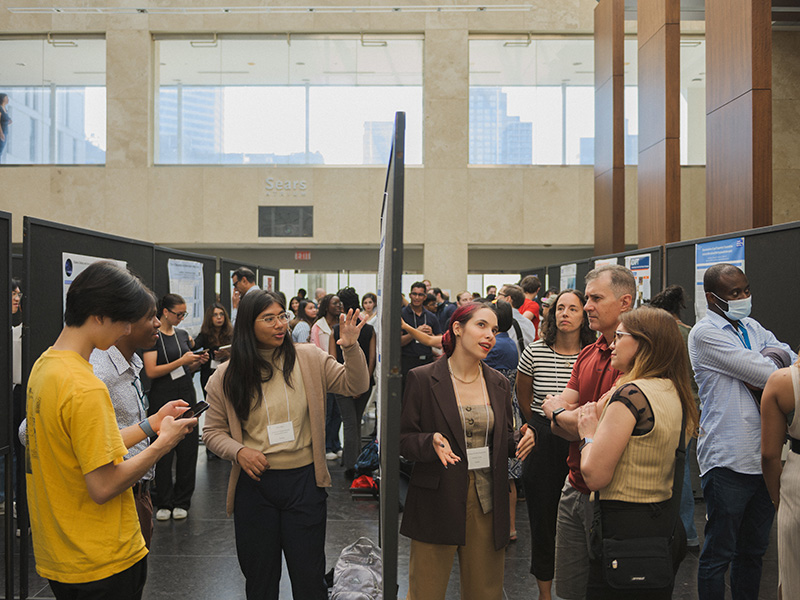2024 URO Showcase: So, this is how research actually works!

Eight undergraduates got real-world experience as research assistants and presented on the respective projects at TMU's URO Showcase in September.
Photo by Alyssa K. Faoro
This year at the fall Undergraduate Research Opportunities (URO) Showcase, eight students presented research that’s currently being conducted at the Faculty of Community Services.
The concept itself was nothing new. All eight had learned — at least in theory — about research methods and processes. But this time, the experience was different.
No prefabricated course assignment; no textbook-perfect pathway. The students had now entered the realm of real-world academic research — with all its twists, turns, challenges and ‘aha’ moments.
Hosted by TMU’s Office of the Vice-President, Research and Innovation, the URO program funds summer research assistantships in each faculty. By design, it gives undergrads the rare chance to personally share in the university’s larger research enterprise.
Unlike regular coursework, student participants are directly mentored by a supervising professor. Projects are real — often in collaboration with other professors, researchers and community partners. Some hold the potential for tangible impact and publication in academic journals.
Through the process, students develop valuable skills — like communication, collaboration, presentation, knowledge translation, and more.
Equally important, students gain authentic, first-hand, behind-the-scenes experience with how research actually works in the real world. For some, this can be a game-changer, opening up new horizons and career directions.
Three students recently shared thoughts on their undergraduate research assistantship experience.
.jpg)
Eye-opening discoveries
Fueled for Success — School Food Programs and Success in Schools: Exploring the association between access to a school food program and a child’s ability to meet provincial academic achievement standards in grades 3 and 6.
Supervisor: Prof Jessica Omand
What unexpected finding surprised you? Contrary to our hypothesis, we discovered that access to a school food program was not associated with meeting provincial standards in any EQAO subject for both grades 3 and 6. For our next steps, we plan to explore whether the Learning Opportunities Index (LOI) — a measure of the schools’ external challenges related to student success — explains why we did not see the hypothesized relationship.
What impact did the URO have on you? It was enriching, full of self-discovery and growth! I finally got the chance to apply theory and skills I’d learned over the past three years. As an aspiring pediatric nutrition specialist, I truly enjoyed working alongside esteemed professors in the field, and contributing to a critical project aimed at informing policymakers.

Uncharted territory
Honouring Black Refusal Through Counterstories and Lived Experiences: This research clarifies how anti-Black racism can be disrupted, confronted and challenged in the early childhood education and care (ECEC) context — and explores what pro-Black ECEC classrooms could look like.
Supervisor: Prof Janelle Brady
What was your biggest challenge? In class, everything is predictable and structured, but in real-world research, so many moving parts need to be coordinated, such as working with participants' confidentiality, managing data and refining approaches.
What did you find most rewarding? Having a share in such an underexplored, understudied area of research which will push the field forward in representing marginalized voices. Also, interacting with other Black professors was empowering and gave me a sense of belonging and representation.
This project was funded by the SSHRC Undergraduate Student Research Awards (external link) program.

Networking and community engagement
The Arts, Community & Hybrid Identities: This project explores how creative arts and spaces can be used to bridge community with academia, and to open up critical reflection and imagination of new social orders.
Supervisor: Prof Ken Moffatt
What made this experience unique? The research process was very different from classwork. Since we were asking questions that have not yet been answered, it was much more iterative and exploratory — as opposed to simply learning from existing literature.
How did you benefit from the interactions? My supervisor connected me with so many individuals and community organizations, all passionate about our themes of arts-based community research. Working as a team full of people I respect and admire gave me opportunities for learning and publishing beyond what I expected from this summer. This will be invaluable for my academic and professional career.
Students & projects
In addition to Salado, Youssef and Caitlin (featured above), thanks to five other students who worked on the following research projects:
Nutrition in the Early Years and Success in School
Marc Hnatyshin (Nutrition and Food)
Supervisor: Jessica Omand
Exploring the Experiences of Black Families who are Unnecessarily Investigated for Maltreatment in Ontario’s Child Welfare System
Teresa Nigro (Criminology)
Supervisor: Travonne Edwards
Sustainability Education in Dietetics Graduate Programs in the United States
Tina Farokifar (Nutrition and Food)
Supervisor: Jessica Wegener
Systematizing Black Experiences with Planning in Canada
Linda Musui (Urban & Regional Planning)
Supervisor: Magdalena Ugarte
Families Responding to Substance Use Disorder: A Community-Engagement Study to Promote Family-Centred Public Health Policy and Health Service Delivery
Luwam Ermias (Nursing)
Supervisor: Oona St-Amant
This project was funded by the Undergraduate Student Research Awards (external link) program.


